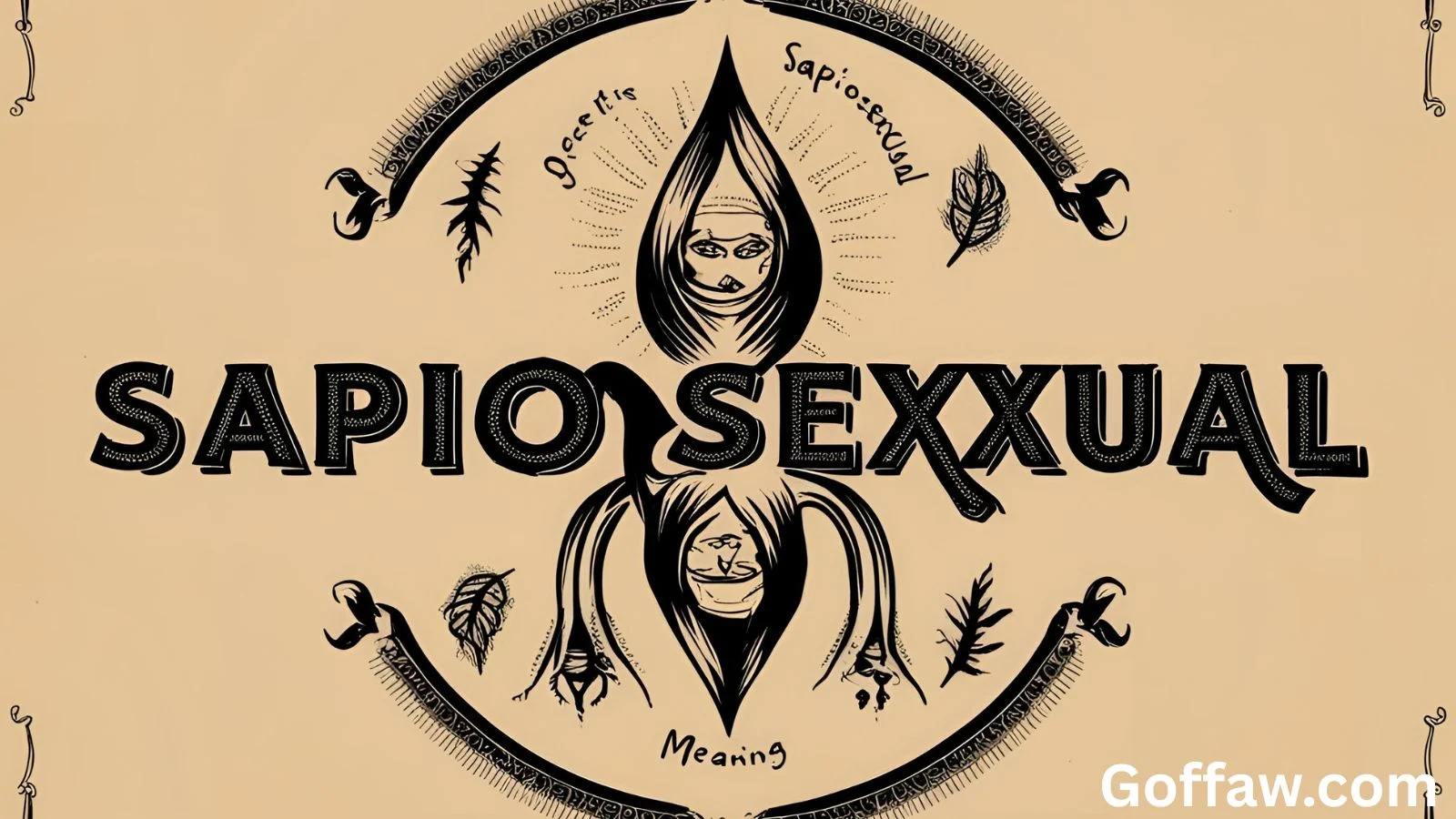In today’s ever-evolving landscape of identity and attraction, new terms often emerge that help people better articulate their preferences, values, and emotional orientations.
One such term that has caught attention in recent years is “sapiosexual.” While it may sound complex or even unfamiliar at first, its meaning is rooted in something many of us value: intelligence.
So, what exactly does it mean to be sapiosexual? Why does this term matter in modern dating and communication? And how can you navigate conversations when this word appears in text or speech?
This in-depth article will explore the definition, origin, social implications, and alternatives to the term “sapiosexual” in both casual and professional contexts. We’ll break down its usage, help you understand the nuance, and provide 11 real-life examples that offer alternatives and clarity.
Let’s begin.
What Does “Sapiosexual” Mean?
The term “sapiosexual” refers to a person who is primarily attracted to intelligence in others. For a sapiosexual individual, a person’s mind, thoughts, intellect, and wit are the most compelling traits—often more important than physical appearance.
This attraction isn’t limited to academic smarts. It can include:
- Deep conversations about life, philosophy, or psychology
- Intellectual banter
- Emotional intelligence
- Sharp humor
- Curiosity and creativity
For many sapiosexuals, mental stimulation is the ultimate aphrodisiac.
Etymology of Sapiosexual
The term combines two parts:
- “Sapien” or “sapio” – derived from Latin “sapere,” meaning to be wise or to taste/discern
- “Sexual” – referring to attraction
Thus, a sapiosexual is someone sexually or romantically attracted to wisdom or intelligence.
Although it’s not currently recognized by most medical or psychological authorities as a formal sexual orientation, it is widely accepted in pop culture, dating apps, and social discourse.
Sapiosexual in Text and Everyday Conversation
You may see the term “sapiosexual” appear in bios, dating profiles, or texts like:
- “Looking for deep thinkers only. Proud sapiosexual.”
- “If you can hold an intelligent conversation, you already have my heart.”
- “Sapiosexuals only—swipe left if you don’t read books.”
In these cases, the word signals a preference for mental compatibility—not just romantic attraction.
Why the Term Matters Today
Understanding this term is important because it highlights a shift in what people value in relationships. With the rise of digital communication, emotional depth and mental clarity are often judged before anything physical. People are not only choosing partners based on looks or chemistry—they are increasingly prioritizing mindset and values.
In fact, being sapiosexual might align with the broader desire for:
- Authenticity in relationships
- Deeper emotional connections
- More meaningful conversations
Criticisms and Controversies Around the Term
Though many embrace it, the term “sapiosexual” isn’t without its critics. Some argue that:
- It can sound elitist, implying that people who aren’t perceived as “intelligent” aren’t worthy of love.
- Intelligence is subjective, and what one person finds intellectually stimulating may bore someone else.
- Some feel that using the term in dating profiles can come off as pretentious or dismissive.
Still, when used thoughtfully, it can be a helpful way to express one’s attraction preferences.
11 Examples of Alternatives to “Sapiosexual” in Different Contexts
Now that you understand the meaning, let’s explore some ways to say “sapiosexual”—in more polite, professional, or casual language.
These phrases will help you express the same idea without sounding rigid or repetitive:
1. “I’m drawn to deep thinkers.”
Tone: Thoughtful, soft
Use in a sentence: “I’m drawn to deep thinkers. I love conversations that go beneath the surface.”
Why it works: This sounds natural, avoids labels, and gets your point across clearly.
2. “I find intelligence incredibly attractive.”
Tone: Direct, clear
Use in a sentence: “Looks are nice, but I find intelligence incredibly attractive.”
Why it works: It’s respectful and relatable, making it ideal for both casual and semi-professional conversations.
3. “I value meaningful conversations.”
Tone: Professional, warm
Use in a sentence: “I’ve always valued meaningful conversations over small talk.”
Why it works: Great for bios, interviews, or first dates—simple and sincere.
4. “Mental stimulation is important to me.”
Tone: Intellectual, calm
Use in a sentence: “I need mental stimulation to really connect with someone.”
Why it works: This keeps the focus on your needs without over-explaining.
5. “I connect best with people who challenge my mind.”
Tone: Honest, expressive
Use in a sentence: “I connect best with people who challenge my mind and make me think differently.”
Why it works: Shows emotional intelligence and openness.
6. “Intellectual chemistry matters more to me than physical looks.”
Tone: Bold, self-aware
Use in a sentence: “I’m not shallow—I just think intellectual chemistry matters more than looks.”
Why it works: Confident and refreshingly honest, without sounding arrogant.
7. “I admire curious minds.”
Tone: Friendly, light
Use in a sentence: “I really admire curious minds—people who are always learning.”
Why it works: Gentle and charming, perfect for casual settings or dating apps.
8. “Someone’s mind is what draws me in.”
Tone: Romantic, poetic
Use in a sentence: “It’s not your eyes—it’s your thoughts. Someone’s mind is what draws me in.”
Why it works: Creative and romantic without sounding cliché.
9. “I love talking to people who have unique perspectives.”
Tone: Open-minded, curious
Use in a sentence: “I enjoy people who make me see the world differently.”
Why it works: Implies intellectual attraction with a broader human interest.
10. “Substance over surface—that’s what I care about.”
Tone: Bold, modern
Use in a sentence: “Substance over surface. That’s my dating motto.”
Why it works: Has a powerful ring to it and is easy to remember.
11. “Brains before beauty, always.”
Tone: Witty, casual
Use in a sentence: “Brains before beauty, always—it’s just how I’m wired.”
Why it works: Catchy and fun, while still expressing sapiosexual tendencies.
How to Choose the Right Alternative
Choosing the right way to express your attraction to intelligence depends on the context, audience, and tone.
Here’s a quick guide:
| Context | Best Alternatives |
|---|---|
| Dating App Bio | “I’m drawn to deep thinkers” / “Brains before beauty” |
| Job Interview (about personal values) | “I value meaningful conversations” |
| Casual Chat | “I admire curious minds” / “I love unique perspectives” |
| Professional Bio | “Mental stimulation is important to me” |
| Romantic Message | “Someone’s mind is what draws me in” |
Why These Alternatives Work Better for Google and Everyday Use
Google, particularly through AdSense and SEO guidelines, prefers natural, user-focused language that avoids overused jargon or controversial identity terms. While “sapiosexual” is not a banned term, using it excessively or without context can reduce your content’s clarity and readability.
By offering alternative phrases:
- You increase audience engagement
- You improve SEO readability
- You maintain inclusivity and professionalism
Plus, using natural language helps you sound more authentic, which builds trust—whether online or in real life.
Closing Thoughts
The term sapiosexual has added nuance to how we think about love, attraction, and human connection. It highlights that for many, the most compelling quality in another person is not how they look—but how they think.
However, language is powerful. And while “sapiosexual” serves its purpose, there are many other ways to express that you’re someone who loves intellect, values deep thought, and is moved by mental connection.
Whether you say you’re a sapiosexual or that you “admire curious minds,” what truly matters is that you’re being authentic about what draws you to others.
Be smart. Be sincere. Be you.




